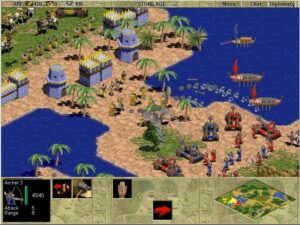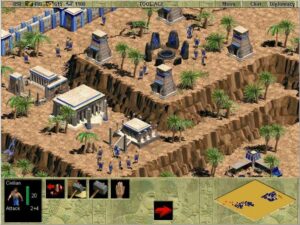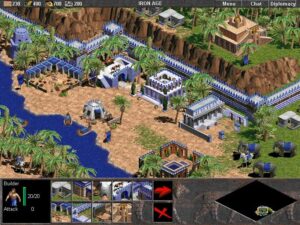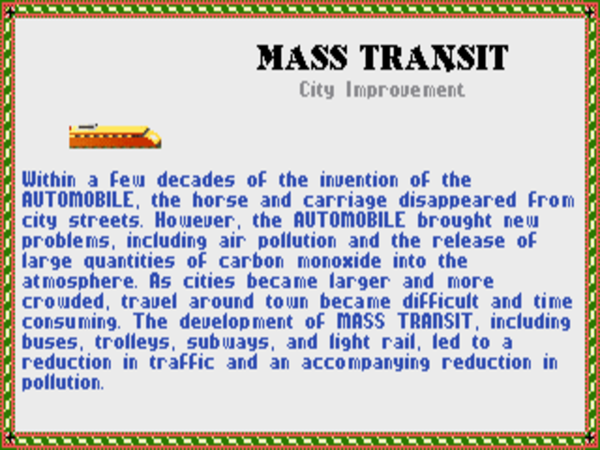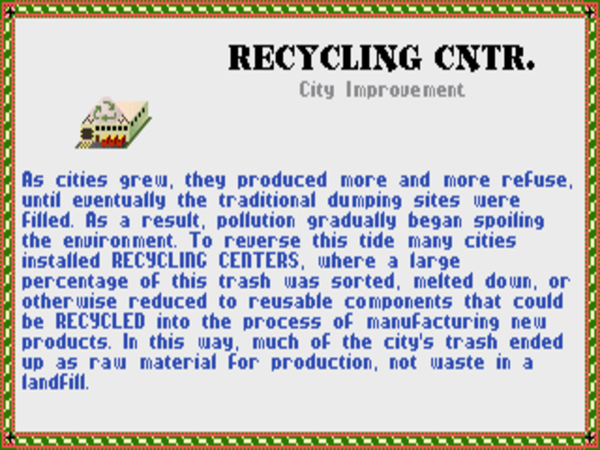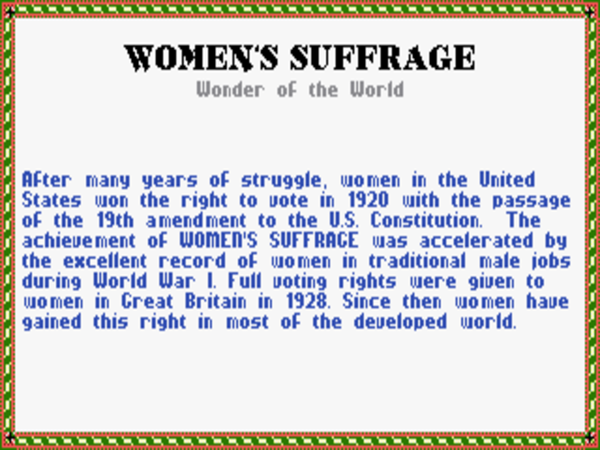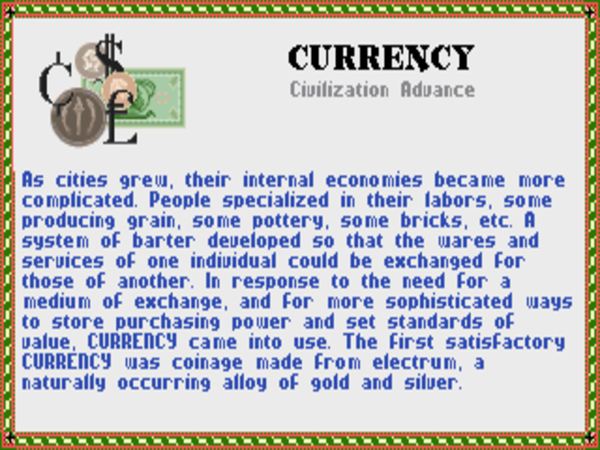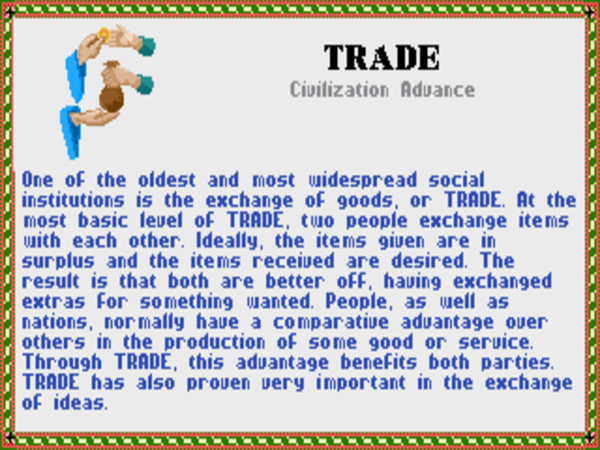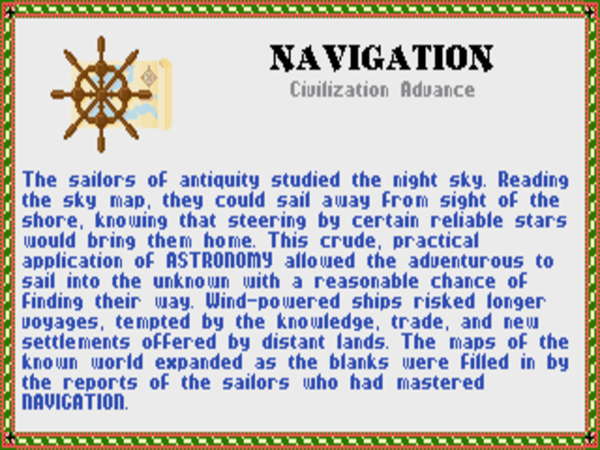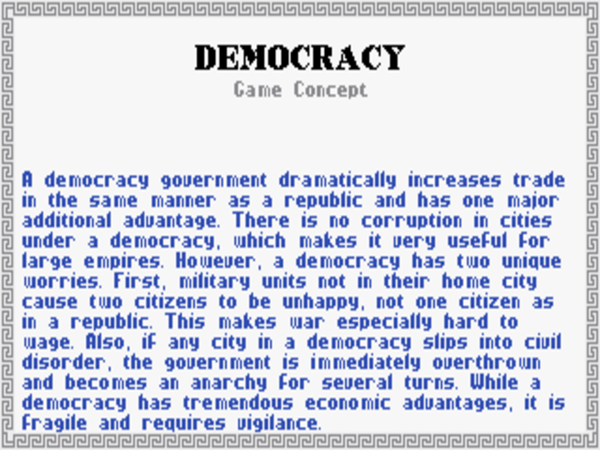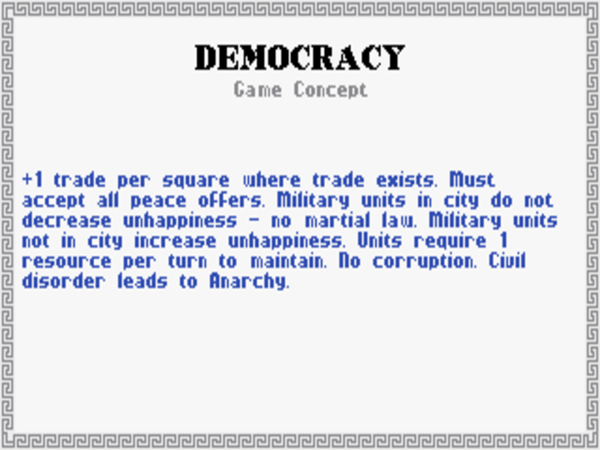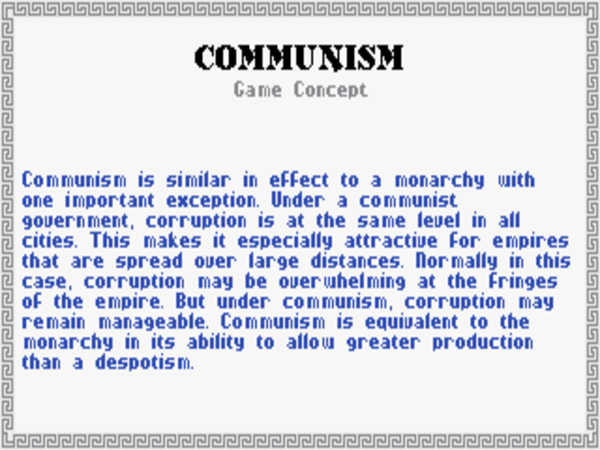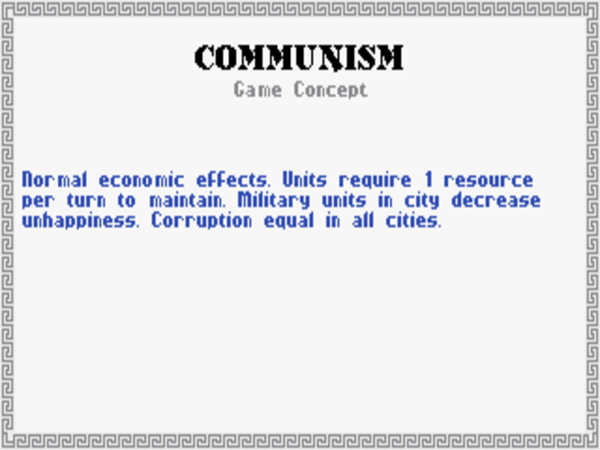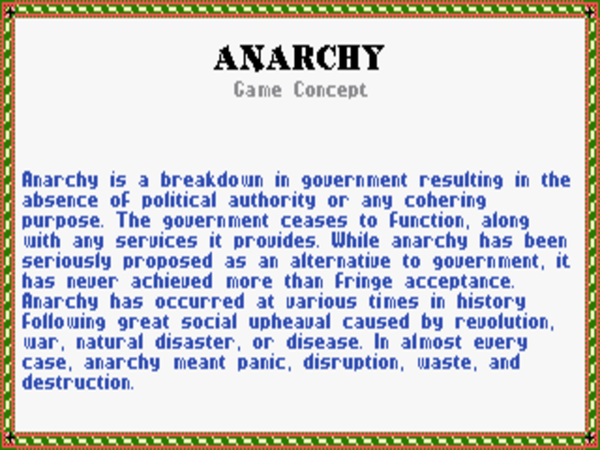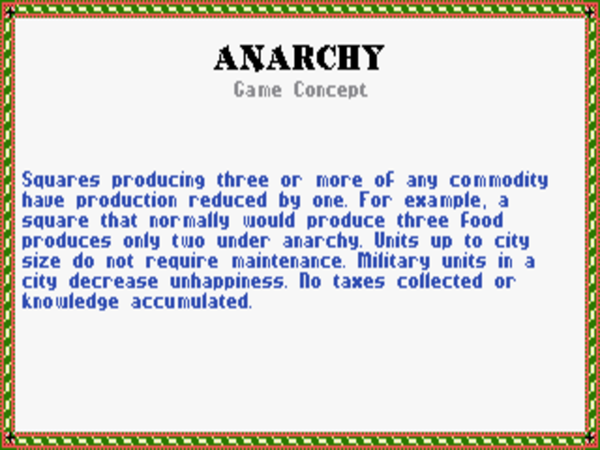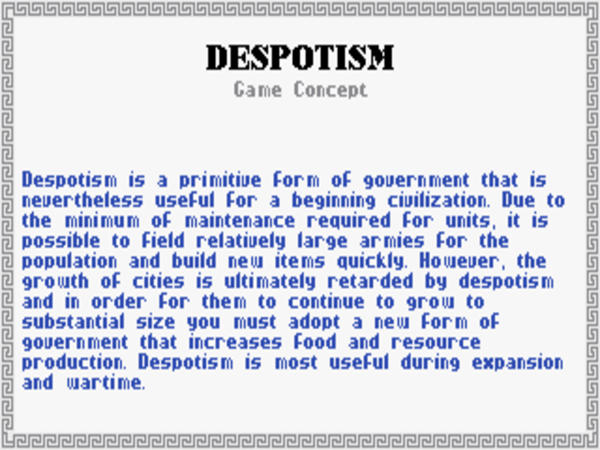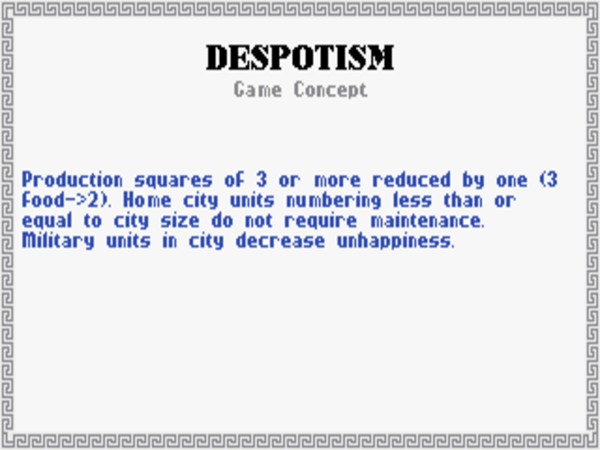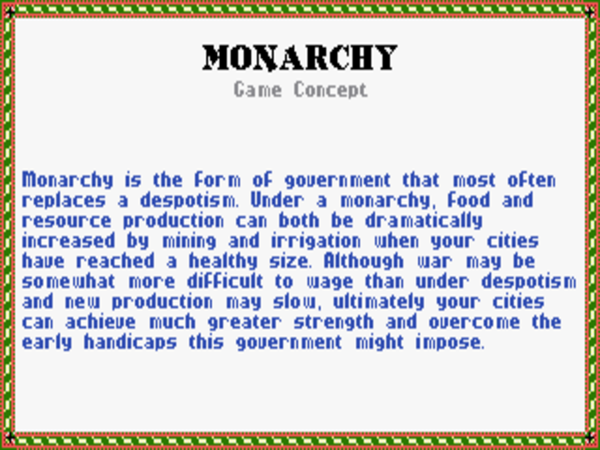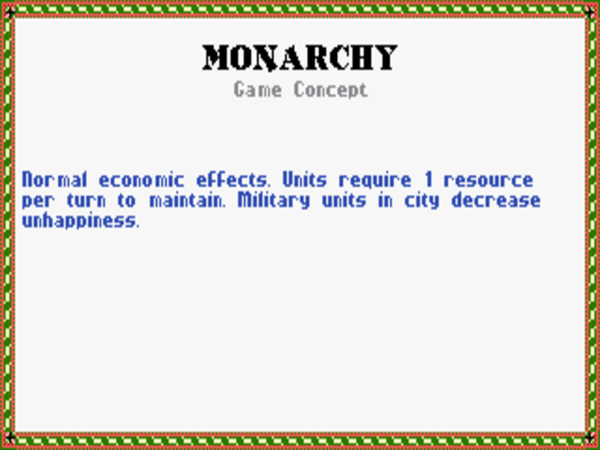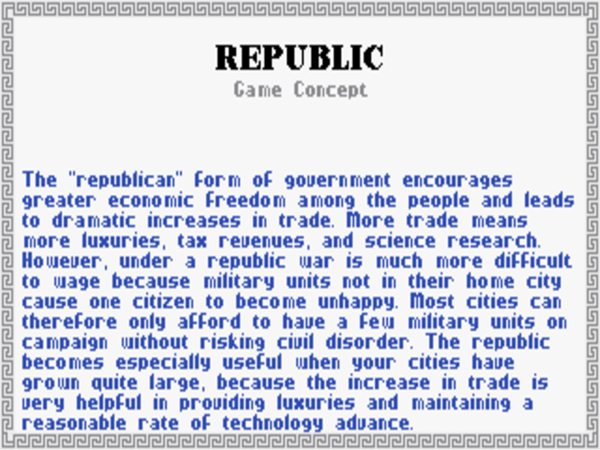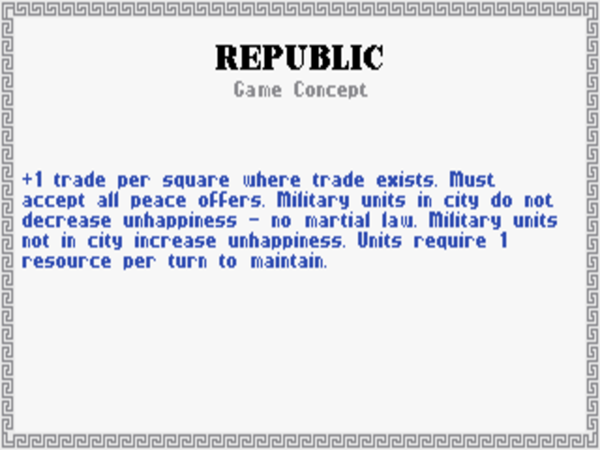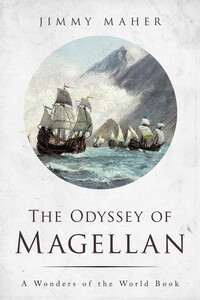We don’t have a strategy to do a $200 game console that is a direct competitor to what Nintendo, Sega, and Sony are doing…
— Bill Gates, June 1996
It’s hard to overstate the scale of the real-time-strategy deluge of the late 1990s. For a period of several years, it seemed that every studio and publisher in the industry was convinced that duplicating the gameplay of Blizzard’s Warcraft and Westwood’s Command & Conquer franchises, those two most striking success stories in the business of computer games since Myst and DOOM, must surely be the digital equivalent of printing money. In the fall of 1997, Computer Gaming World magazine counted no fewer than 40 RTS’s slated for release during the coming Christmas season alone, to go along with the “nearly 20” that had already appeared with names other than Warcraft or Command & Conquer on their boxes. With no other obvious way of sorting through the jumble, the magazine chose simply to alphabetize the combatants in this “biggest clone war to hit the PC,” resulting in a list that began with 7th Legion and ended with Waterworld.
If those names don’t ring any bells with you today, you aren’t alone. While many of these games were competently made by genuinely enthusiastic developers, few mass movements in gaming have ever felt quite so anonymous. Although the drill of collecting resources, building up an army, and attacking your computerized or human enemies in real time struck a lot of people as a whole lot of fun — there was, after all, a reason that Warcraft and Command & Conquer had become so popular in the first place — it was hard for the creators of the next RTS generation to figure out what to do to set their games apart, whilst also staying within a strict set of design constraints that were either self-imposed or imposed upon them by their conservative publishers. Adventure games, CRPGs, and first-person shooters had all been the beneficiaries or victims of similar gluts in the past, but they had managed to explore a larger variety of fictional contexts if not always gameplay innovations. When it came to RTS’s, though, they all seemed to follow in the footsteps of either the high-fantasy Warcraft or the techno-futuristic Command & Conquer in their fictions as well as their gameplay. This can make even those members of the RTS Class of 1997 that are most fondly remembered today, such as the fantasy Myth or the science-fictional Total Annihilation, feel just a little generic to the uninitiated.
One game from this group, however, did stand out starkly from the crowd for the editors of Computer Gaming World, as it still does in the memories of gamers to this day. Whilst sticking to the tried and true in many of its mechanics, Age of Empires dared to try something different in terms of theme, mining its fiction from the real cultures of our planet’s ancient past. It played relatively straight with history, with no magic spells or aliens in sight. This alone was enough to make Age of Empires a welcome gust of fresh air in a sub-genre that was already sorely in need of it.
Yet there was also something else that made it stand out from the pack. Although its developer was an unknown outfit called Ensemble Studios — one of many that were springing up like toadstools after a rain to feed the real or perceived hunger among gamers for more, more, more RTS’s — its publisher was, of all companies, Microsoft, that one name in software that even your grandparents knew. The arrival of Age of Empires signaled a new era of interest and engagement with games by the most daunting single corporate power in the broader field of computing in general. If anyone still needed convincing that computer games were becoming mainstream entertainments in every sense of the phrase, this ought to have been enough to do the trick. For, whatever else one could say about Microsoft, it was not in the habit of exploring the nooks and crannies of the software market — not when there was a sprawling middle ground where it could plant its flag.
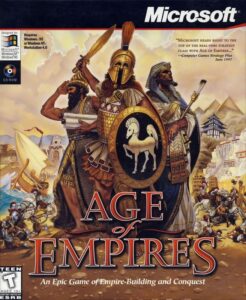
The man behind Ensemble Studios was one Tony Goodman, whose life’s direction had been set in the sixth grade, when his father, a professor of management science at Southern Methodist University in Dallas, Texas, brought home a terminal that could be used to connect to the university’s mainframe. “He would give me the same problems that he had given his students,” says Goodman. “My father would say, ‘Tony, I have a puzzle for you.’ Immediately, I was sucked in for the rest of the day. I always looked at the problems as puzzles. I loved puzzles and games, so I just couldn’t get enough. It came to me naturally. I remember saying, ‘This is it. This is what I’m going to do with the rest of my life!'”
In an ironic sense, Goodman’s career path would be the opposite of that of the typical game developer, who joins the world of more plebeian software development only after getting burnt out by the long hours and comparatively low pay in games. Long before starting Ensemble Studios, Goodman made a career for himself in the information-technology departments of the banking industry, specializing, like his father before him, in data-visualization tools and the like that could aid executive-level decision-making. Along the way, he learned much that he would later be able to apply to games — for, he says, good games have much in common with good software of any other stripe: “One of the most valuable things that I learned about developing software was that, for users to be productive, the software had to be fun to use. The key is to keep people entertained long enough to be rewarded. This also happens to be the fundamental dynamic of games and, indeed, all human experiences.”
In 1989, Tony Goodman and three partners formed Ensemble Corporation — not to be confused with Ensemble Studios — in his garage. Two years later, they released Command Center, a user-friendly front-end for Borland’s Paradox database system that could “automate queries, reports, forms, and graphics.” The company exploded from there, becoming a darling of the Forbes and Inc. set.
Throughout his years in business software, Goodman never lost touch with that younger version of himself who had been drawn to computers simply because he found them so wonderfully entertaining. He and his older brother Rick, who joined Ensemble Corporation as a programmer shortly after the release of Command Center, were lifelong board and computer gamers, watching at first-hand the aesthetic and technical evolution of the latter, parallel software industry. They found a kindred soul in another Ensemble programmer named Angelo Laudon, who, like them, could appreciate the higher salaries and profit margins in productivity software but nonetheless felt a longing to engage with his biggest passion. “We would talk about games until the early hours of the morning,” says Tony Goodman. “I loved the business of developing software, but I wanted to create products that everyone would tell their friends about. I wanted to create a pop-culture phenomenon. If you want to create software that people really want, developing videogames places you at the center of the universe.”
He realized that computer games had hit a watershed moment when Microsoft announced Windows 95, and with it DirectX, a software subsystem that would allow people to install and run even cutting-edge games as effortlessly as any other type of software, without the travails of the bespoke IRQ and DMA settings and memory managers that had been such a barrier to entry in the past. If he ever wanted to try to make games of his own, he knew, the time to get started was now, between the market’s expansion and the inevitable market saturation that would follow. Rick Goodman remembers how one day his brother
walks into work, assembles the team of database programmers, and says, “Would any of you guys rather be making games than database applications?”
I think people were caught off-guard. We were looking around the room, like, “Is this a trick question?” But I raised my hand, and Angelo Laudon raised his. Tony was serious. He said, “I’m going to pull you guys aside and we’ll make a game.” I thought that was awesome. I said, “Okay! What kind of game?” None of us had any idea.
For months thereafter, they continued to do their usual jobs during the day, then gathered again in the evening to hash through ideas and plans. During one of these sessions, Rick suddenly brought up a name that Tony hadn’t heard in a long, long time: Bruce Shelley, an older fellow with whom the brothers had played a lot of board games during their pre-teen and teenage years. Shelley worked in computer games now, said Rick — had in fact assisted Sid Meier with the design of Railroad Tycoon and Civilization. “Maybe — maybe — he’s not busy.”
And lo and behold, it turned out that he wasn’t. After finishing Civilization, Shelley had left Meier and his other colleagues at MicroProse Software in order to follow his new wife, a banking executive, to Chicago, where she’d secured a job that was far more lucrative than any that he’d ever held. He was writing gaming strategy guides out of his home office when Tony Goodman called him up one day out of the blue: “I hadn’t heard from him in fifteen years, and here he is with his own business in Dallas, doing software for banks, and he’s got guys who want to make computer games. We had these long conversations about what it takes to make a game. I told my wife, ‘I think this guy’s going to start a game company.’ And finally he did call me and say, ‘We are going to start a game company, and we want you to be involved.'” Shelley agreed to fly down to Dallas to talk it over.
But they still weren’t sure what kind of game they wanted to make. Then, as Shelley remembers, “One day one of the guys walked in with Warcraft. He said, ‘We’ve got to make this. We’ve got to make one of these. This is blowing the socks off the gaming world right now.'” It all came together quickly after that. Why not combine the hottest current trend in gaming with the last game Shelley had helped to make, which was already widely regarded as a hallowed classic? “The idea was, let’s take the ideas of Civilization — an historical game — and do a Warcraft/Command & Conquer-style RTS.”
This, then, was the guiding ethos of the project, the first line of any pitch document to a potential publisher: to combine the fast action of the typical RTS with at least some of the more expansive scope of Civilization. You would guide a tribe — in time, a full-fledged civilization — through the Paleolithic Age, the Neolithic Age, the Bronze Age, and the early stages of the Iron Age (where this particular voyage through history would end, leaving the table set for a sequel). Along the way, you would research a variety of technologies and build ever more impressive structures, some of which would not be strictly military in application, such as granaries and temples. There would even be a version of Wonders of the World, those grandest of all Civilization achievements, waiting to be built. But the whole experience would be compressed down into the typical RTS time frame of an hour or so, as opposed to the dozen or more hours it might take to get through a full game of MicroProse’s Civilization.
Initially titled Dawn of Man, the game evolved slowly but steadily betwixt and between the usual daily routine at Ensemble Corporation. The other Ensemble principals took Tony Goodman’s after-hours vanity project with a shrug. They didn’t really understand it, but he had worked hard for a long time and was entitled to it, they supposed, in the same way that other successful entrepreneurs were entitled to go out and buy themselves a Porsche.
When Tony Goodman started shopping the game to prospective publishers, it already looked and played decently well. He was growing more and more convinced that he had a winner on his hands. Yet even he was surprised at his good fortune when he made a cold call to Stuart Moulder, a middle manager at Microsoft’s relatively little-remarked games division, and captured the interest of the biggest fish in the software sea.
Historically speaking, Microsoft’s relationship to games had long been a tentative one. It was true that, in the very early days of the company, when it was known chiefly as a peddler of 8-bit BASIC implementations, Microsoft had published a fair number of games. (The most important of these was probably its ethically dodgy commercial version of Will Crowther and Don Woods’s classic Adventure, the game that lent its name to a whole genre.) Even after it signed the landmark deal to provide IBM’s first mass-market personal computer with an operating system — a deal that resulted in the ever-evolving PC standard that remains dominant to this day — Microsoft continued to dabble in games for a while. There was a good reason for this; it’s often forgotten today that IBM and Microsoft first envisioned that original IBM PC becoming a fixture in homes as well as offices. But when home users didn’t embrace the platform as rapturously as the partners had hoped, even as Corporate America took it to its bosom more quickly than they had ever dreamed, Microsoft abandoned games, thanks not only to the bigger profits that could be earned in operating systems and business software but out of fear of the stigma that surrounded games and their makers in the more “serious” software circles of the 1980s. The one exception to Microsoft’s no-fun-allowed policy was — at least according to some people’s definition of “fun” — Flight Simulator, an early product for the IBM PC that turned into a minor cash cow for the company; like Microsoft’s operating systems and productivity packages, it was a program that people proved willing to buy all over again every few years, whenever it was updated to take advantage of the latest graphics cards and microprocessors. Its focus on the pedantic details of flying a real civilian airplane — the complications of VOR navigation systems and the insidious threat of carburetor ice were implemented, but absolutely no guns were to hand — presumably made it acceptable in Microsoft’s staid software lineup.
The release in 1990 of the comparatively approachable, user-friendly Windows 3.0 operating environment marked the moment when more conventional games began to become less of an anathema to Microsoft once again. An implementation of the hoary old card game Solitaire was among this latest Windows’s standard suite of software accessories. As easy to pick up as it was to put down, it became the perfect time killer or palate cleanser for hundreds of millions of office workers all over the world, enough to make it quite probably the most popular videogame ever in terms of sheer number of person-hours played. Microsoft went on to release four “Entertainment Packs” of similarly simple games for the Windows 3.x desktop, and to include a clever Battleship variant called Minesweeper in 1992’s Windows 3.1. Microsoft was slowly loosening up; even Bill Gates confessed to a Minesweeper addiction.
The company now began to dabble in more ambitious games, the kind that could stand on their own rather than needing to be packaged a half-dozen to a box. There came a golf game for the corporate set, and then there came Space Simulator, an attempt to do for armchair astronauts what Flight Simulator had for so long been doing for armchair aviators. But the big shift came with Windows 95, the first (and arguably only) Microsoft operating system whose arrival would become a full-fledged pop-culture event. That old dream of the PC as a standard for the home as well as the office was coming true in spades by now; amidst the hype over multimedia and the World Wide Web, ordinary people were buying computers to use in their homes in unprecedented numbers. Microsoft was determined to serve their wishes and needs just as they had for so long been serving those of the corporate world. One result of this determination was DirectX, which allowed Microsoft’s customers to install and play audiovisually rich, immersive games without having to learn the arcane mantras of MS-DOS or memorize every detail of a computer’s hardware configuration. Another, less initially prominent one was a more empowered games division, which was for the first time given permission to blow through the musty vibes of office life or educational value that had clung to Microsoft’s earlier entertainment efforts and give the hardcore gamers what they really wanted.
At the same time, though, it should be understood that even by this point game publishing had not become a major priority at Microsoft. Far from it. There remained plenty of people inside the company who didn’t think getting into that business was a good idea at all, who feared that it would be perceived as a conflict of interest by the very extant game publishers Microsoft was trying to convince to embrace DirectX, or who thought the potential rewards just weren’t worth the distraction; after all, even if Microsoft managed to publish the most popular computer game in the world, those revenues would still pale in comparison to the Windows and Office juggernauts. Among the skeptics who did no more than tolerate the notion of Microsoft peddling games was Bill Gates himself.
The games division was in the keeping of one Tony Garcia at this time. One day a manager a rung below him on the hierarchy, a “talent scout” named Stuart Moulder whom he had explicitly tasked with finding hot “gamer’s games” to sway the naysayers and reinvigorate the division, knocked on his door to say that he’d just seen an RTS work-in-progress by a brand-new studio that was being bootstrapped out of a business-software maker. Yes, Moulder rushed to add, he understood that no part of that sentence sounded overly promising at first blush. But the game itself looked surprisingly good, he said. Really, really good. This could be the Big One they’d been waiting for.
So, Garcia invited the Dawn of Man crew to come up to Microsoft’s headquarters in Redmond, Washington, and show him what they had. And he too liked what he saw enough to want to put the Microsoft logo on it.
Microsoft was an infamously tough negotiator, but Tony Goodman was no slouch in that department either. “Negotiation is often about compromise,” he says. “However, negotiating with Microsoft is more often about leverage. Microsoft negotiates hard. They don’t respect you unless you do the same.” Goodman gained some of his needed leverage by showing the game to other publishers as well — Electronic Arts, Hasbro, even Discovery Channel Multimedia (who were attracted by the game’s interest in real history) — and showing Microsoft the letters they had sent him to express their very real interest. Meanwhile Microsoft’s marketing department had already come up with the perfect name for a game whose historical time frame extended well beyond the Dawn of Man: Age of Empires. Having invented the name, Microsoft insisted on owning the trademark. Goodman wasn’t able to move the beast from Redmond on this point, but he did secure a royalty rate and other contract terms that he could live with.
In February of 1996, Goodman’s moonlighting venture was transformed from a skunk works inside a business-software maker to a proper games studio at long last, via official articles of incorporation. That said, it wouldn’t do to exaggerate the degree of separation even now: Ensemble Studios was still run out of the office of Ensemble Corporation. It had about ten employees in the beginning. Angelo Laudon was listed as lead programmer and Rick Goodman as lead designer, despite the latter’s complete lack of experience in that field. Fortunately, Bruce Shelley had agreed to join up as well, coming down to Dallas about one week of every month and working from home in Chicago the rest of the time.
Soon after Age of Empires became a real project from a real studio, Tony Garcia left Microsoft. He was replaced by Ed Fries, a veteran member of the Office team who had programmed games for 8-bit Atari computers before starting at Microsoft in 1986. When he agreed to take this new job in games, he was told by his colleagues that he was committing career suicide: “Why would you leave Office, one of the most important parts of this company, to go work on something nobody cares about?”
For all their apparent differences in size and clout, Microsoft and Ensemble Corporation were in an oddly similar boat; both were specialists in other kinds of software who were trying to break into games. Or rather, a handful of passionate individuals within each of the companies was, while everyone else looked on with bemused indifference. In an odd sort of way, though, said indifference was the passionate individuals’ superpower. If the new RTS failed utterly, it wouldn’t show up on the ledgers of Microsoft or Ensemble Corporation as anything more than a slight blip on an otherwise healthy bottom line. This lack of existential stakes — an extreme rarity in an industry whose instability is legendary — was greatly to the game’s benefit. With no pressure to have it finished by such-and-such a date or else, the developers could fuss over it until they got every detail just exactly perfect. Sticking close to the RTS playbook even in his choice of metaphors, Rick Goodman describes time in game development as “a resource, like collecting wood. The more of it you have, the better off you are. We took a lot of time. A lot of time. Most companies would not have survived that length of time.”
During that time, the game got played. Over and over and over and over again, it got played, not only by the Ensemble crew but by lots of folks at Microsoft, including the experts at that company’s “usability laboratory.” Microsoft brought in people from the street who had never played an RTS before, who didn’t even know what those initials stood for, and had them run through the early tutorial missions to see if they communicated what they were supposed to. Rinse and repeat, rinse and repeat. Age of Empires was tested and tweaked no differently than it would have been if it was a $1000 mission-critical software application destined to be the fodder of corporate purchasing departments all over the world.
For this was to be a broad-spectrum computer game, beamed straight at the center of the mass market but wide and diffuse enough to capture an unusual variety of playing styles and priorities. Bruce Shelley has spoken often since of the value of putting “multiple gaming experiences within one box.”
To reach a broad audience, include a variety of game types and adjustable game parameters that combine in different ways to create a range of quite different gaming experiences, all within the same game. Examples of different gaming experiences with the Age of Empires games are multiplayer death matches, single-player campaigns, random-map games, cooperative-play games, and Wonder races. Victory conditions, map types, and level-of-difficulty settings are examples of parameters that can be adjusted to create different gaming experiences.
We want the smartest kid in junior-high school (a hardcore gamer) telling his or her friends that our game is his or her favorite right now. When those friends buy our game, they probably won’t be able to compete with the star, but by adjusting those parameters they can still find a type of game that suits them and have fun. The average kids and the smart kids can both enjoy our game, although they play quite different parts of it.
When we provide a variety of gaming experiences within the single box, we increase the number of people who can buy our game and be happy with it. Each of these satisfied customers becomes in turn a potential evangelist.
Although I wouldn’t directly equate being “hardcore” when it comes to games with being “smarter” than those who are not in the way that Shelley (perhaps inadvertently) does here, the larger point is well-taken. This was something that the industry in general was finally coming to realize by the latter 1990s, probably more belatedly than it ought to have done. By making it possible to play the same game in a variety of different ways, you could dramatically expand the size of that game’s audience. You did so by including varying difficulty levels and speed settings, to make the game as easy or hard, as relaxing or frenetic, as any particular player wished. And you did so by including different modes of play: story-driven campaigns, a single-player skirmish mode, online multiplayer contests. It might take additional time and money to make all of these things, especially if you were determined, as you ought to be, to make them all well, but it remained vastly cheaper than making a whole new game. Most older games dictate to you how you must play them; newer ones ask you how you would like to play them. And this has been, it seems to me, an immensely positive development on the whole, broadening immeasurably the quantity and types of people who are able to enjoy games — both each individual game that appears and gaming in the aggregate.
Certainly Age of Empires understood all of this; in addition to selectable difficulty levels and speed settings, it includes campaigns, pre-crafted singleton maps for single- or multiplayer sessions, randomly generated maps, even a scenario and campaign editor for those who want to turn their hobby into a truly creative pursuit. Anyone who has been reading these histories of mine for a while will surely know that the RTS is far from my favorite sub-genre of games. Yet even I found Age of Empires surprisingly easy to get along with. I turned the difficulty and speed down and approached the campaigns as an interactive whirlwind tour of the ancient world; as readers of this site’s companion The Analog Antiquarian are well aware, that is a subject I can never get enough of. I have a friend, on the other hand, who tells me that he can’t remember ever even starting a campaign back in the day, that he jumped right into multiplayer on Day One to engage in ferocious zero-sum contests with his friends and never looked back. And that’s fine too. Different strokes for different folks.
But since I am the person I am, I just have to say a bit more about the campaigns. There are actually four of them in all, chronicling the evolution of ancient Egypt, Greece, Babylon, and Japan. (An expansion pack that appeared about a year after the base game includes three more campaigns that deal exclusively with the rise and fall of Rome.) The campaigns were a labor of love for the lifetime history buff Bruce Shelley, as were the 40-plus pages in the manual dedicated to the twelve different playable civilizations, whose ranks include not only the aforementioned but also such comparatively obscure cultures as the Minoans, the Phoenicians, and even the Shang Chinese, all with strengths and weaknesses that stem from what we know — in some cases, what little we know — of their real-world inspirations.
“We really only needed one grand theme for a civilization that was historical enough to make people believe,” says Rick Goodman. “Like, they know Rome was good at X and the Greeks were good at Y.” For all that Age of Empires is no one’s idea of a studious exploration of history, it does have a little bit more on its mind than the likes of Warcraft or Command & Conquer. At its best, it can make you ponder where and how human civilization came to be, starting as it does with the bedrock resources, the food and wood and, yes, stone out of which everything that followed was built. I’m sure it must have sent at least a few of its young players scurrying to the library to learn a little more about our shared heritage. Perhaps it managed to spark an enduring passion for history in some of them.
The graphics style was an additional key to Age of Empires’s appeal. Bruce Shelley:
The sun is always shining in Age of Empires. It was always a bright, inviting world that you wanted to know more about. I’ve always had problems with dark, forbidding games. You’re crushing your audience — you’re really narrowing who is going to consider buying a game when you make it ugly, dark, and forbidding. Maybe it appeals to a certain audience, but…
When you set out to develop a PC game, the potential market is everyone on Earth who owns a PC. Once you begin making decisions about your game (gory, sci-fi, RTS, shooter), you begin losing potential customers who are not interested in your topic, genre, or style. Commercially successful games hold onto [a] significant share of that market because they choose a topic, genre, and style that connect with a broad audience. The acceptance of the PC into more world communities, different age groups, and by women means that games do not need to be targeted, and perhaps should not be targeted, solely to the traditional gaming audience of young males.
Age of Empires inevitably comes down to war in the end, as do most computerized depictions of history. But the violence is kept low-key in comparison to many another RTS bloodbath, and there is at least a nod in the direction of a non-conquest victory, an equivalent to sending a spaceship off to Alpha Centauri as a capstone to a game of Civilization: if you can build yourself a Wonder of the World in Age of Empires, then defend it for a period of time against all comers, you are declared the victor then and there. A “religious” victory can also be achieved, by collecting all of the religious artifacts on the map or holding all of its sacred sites for a period of 2000 years — about ten minutes in game time. There’s even some nods toward diplomacy, although in practice becoming allies usually just means you’ve agreed not to fight each other quite yet.
I don’t want to overstate the scale of the game’s innovations. At the end of the day, Age of Empires remains an RTS in the classic mold, with far more in common with Warcraft and Command & Conquer than it has with Civilization. It’s an extremely well-made derivative work with a handful of fresh ideas, not a revolution from whole cloth. Its nods in the direction of Civilization are no more than that; it’s not, that is to say, the full-blown fusion that may have been Bruce Shelley’s original vision for it. Compressing into just one hour the first 10,000 to 12,000 years of human civilization, from the dawn of sedentary farming to the splendors of high antiquity, means that lots of the detail and texture that make the game called Civilization so compelling must get lost. Even if you’re a story guy like me, you’ll no longer be marveling that you’ve brought writing, irrigation, or religion to your little group of meeples after you’ve played your first map or two; those things will have become mere rungs on the ladder to the victory screen, the real point of the endeavor. In a rare lukewarm review, GameSpot‘s T. Liam MacDonald put his finger on some of the places where Age of Empires’s aspirations toward Civilization don’t live up to the reality of its well-worn RTS template.
I wish that Age of Empires was what it claimed to be: Civilization with a Warcraft twist. Instead, it is Warcraft with a hint of Civilization. That’s all well and good, but it places it firmly in the action-oriented real-time combat camp, rather than in the high-minded empire-building [camp] of Civilization. The result is Warcraft in togas, with slightly more depth but a familiar feel.
I too must confess that I did eventually get bored with the standard RTS drill of collect, build, and attack that is the basis of almost every scenario. As the scenarios got harder, I gradually lost the will to put in the effort it would take to beat them; I wound up quitting without regrets about halfway through the second campaign, satisfied that I’d had my measure of fun and certain that life is too short to continue with entertainments of any type that you no longer find entertaining. Still, I won’t soon forget Age of Empires, and not just because its theme and atmosphere make it stand out so from the crowd. I would be the last person to deny that it’s an incredibly polished product from top to bottom, a game that was clearly fussed over and thought about to the nth degree. It exudes quality from its every virtual pore.
The Age of Empire intro movie displays some of the game’s contradictory impulses. The scenes of combat are no better nor worse than those of any other game that attempts to make war seem glorious rather than terrible. Yet the weathered ancient stone raises other, more poignant thoughts about the cycles of life, time, and civilization. “For dust you are, and to dust you shall return.”
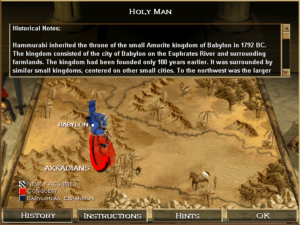
Each campaign follows the historical development of the civilization in question to whatever extent the demands of gameplay allow.
In commercial terms, Age of Empires was a perfect storm, a great game with wide appeal combined with a lot of marketing savvy and the international distributional muscle of the biggest software publisher in the world. The principals from Ensemble remember a pivotal demonstration to Bill Gates, whose reservations about Microsoft’s recent push into games were well-known to all of them. He emerged from his first first-hand encounter with Age of Empires calling it “amazing,” assuring it the full support of the Microsoft machine.
While Microsoft’s marketing department prepared an advertising campaign whose slick sophistication would make it the envy of the industry, Tony Goodman deployed a more personal touch, working the phones at the big gaming magazines. He wasn’t above using some psychological sleight-of-hand to inculcate a herd mentality.
I built relationships with the most recognized gaming magazines. I invested a lot of time with key editors, seeding the idea that Age of Empires was “revolutionary” and would become a “phenomenon.” They may not have believed me at first, but my goal wasn’t to convince them. My goal was to plant wondrous possibilities in their brains and create anticipation, like Christmas for kids.
When the early previews began appearing, they were using the terms that we seeded: “revolutionary” and “phenomenon.” These early opinions were then picked up and echoed by other publications, creating a snowball effect. Eventually, all the publications would get on board with this message, just so they didn’t look out of touch.
Sure enough, in the Computer Gaming World RTS roundup with which I opened this article, Age of Empires was given pride of place at the top of the otherwise alphabetized pile, alongside just one august companion: Starcraft, Blizzard’s long-awaited follow-up to Warcraft II, which was to try the science-fiction side of the usual RTS fantasy/science-fiction dichotomy on for size. As it happened, Starcraft would wind up slipping several months into 1998, leaving the coming yuletide season free to become the Christmas of Age of Empires.
So, while Age of Empires may not have quite lived up to its “revolutionary” billing in gameplay terms, it definitely did become a marketplace phenomenon after its release in October of 1997, demonstrating to everyone what good things can happen when a fun game with broad appeal is combined with equally broad and smart marketing. It doubled Microsoft’s own lifetime sales projections of about 400,000 units in its first three months; it would probably have sold considerably more than that, but Microsoft had under-produced based on those same sales predictions, leaving the game out of stock on many store shelves for weeks on end while the factories scrambled to take up the slack. Age of Empires recovered from those early travails well enough to sell 3 million units by 1999, grossing a cool $120 million. It left far behind even those other members of the RTS Class of 1997 that did very well for themselves by the conventional standards of the industry, such as Myth and Total Annihilation. In fact, Age of Empires and the franchise that it spawned came to overshadow even Command & Conquer, taking the latter’s place as the only RTS series capable of going toe-to-toe with Blizzard’s Warcraft and Starcraft.
And yet that is only a part of Age of Empires’s legacy — in a way, the smaller part. In the process of single-handedly accounting for half or more of the Microsoft games division’s revenue during the last couple of years of the 1990s, Age of Empires changed Microsoft’s attitude about games forever. The direct result of that shift in attitude would be a little product called the Xbox. “I believe there were two successes that had to happen at Microsoft in order for the Xbox console to happen,” says Stuart Moulder. “One was DirectX, which showed that we had the chops on the operating-system side to deliver technology that made it possible to build great games. Then, on the other side, we had to show that we had the ability as a first-party publisher to deliver a hit game aimed at core gamers — because that’s [the] people who buy and play console games.” Thanks to Age of Empires, gaming would be overlooked no more at Microsoft.
Did you enjoy this article? If so, please think about pitching in to help me make many more like it. You can pledge any amount you like.
Sources: The book Gamers at Work by Morgan Ramsay; Computer Gaming World of October 1997, November 1997, and January 1998; Next Generation of June 1996; InfoWorld of April 22 1991.
Online sources include Soren Johnson’s interview with Bruce Shelley, Scott Stilphen’s interview with Ed Fries, David L. Craddock’s long ShackNews series on Microsoft’s gaming history (especially the chapter dealing directly with Age of Empires), Thomas Wilde’s profile of Ed Fries for GeekWire, Richard C. Moss’s history of Age of Empires for Ars Technica, a Microsoft press release from February of 1998, T. Liam MacDonald’s vintage review of Age of Empires for GameSpot.
Finally, the box of documents that Bruce Shelley donated to the Strong Museum of Play were a valuable resource.
A “Definitive Edition” of the original Age of Empires is available as a digital purchase on Steam.
